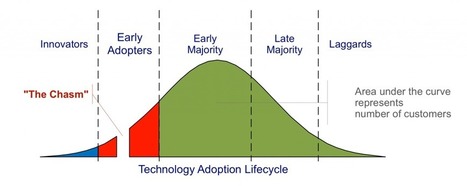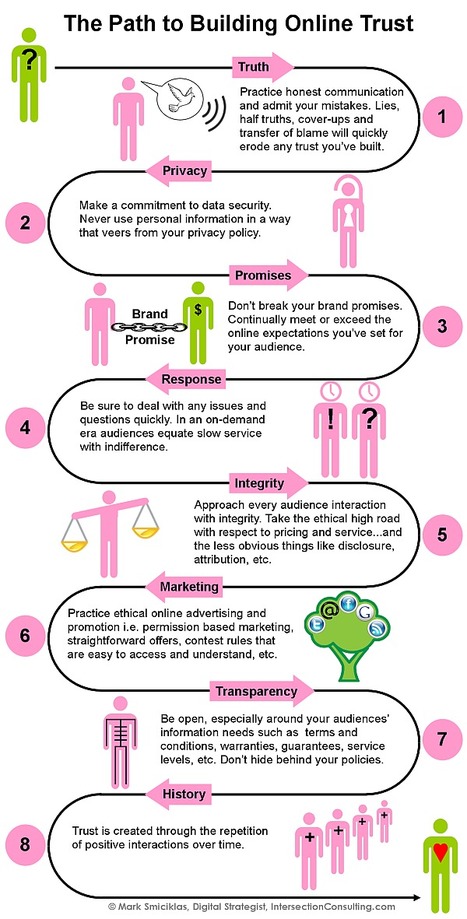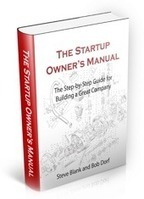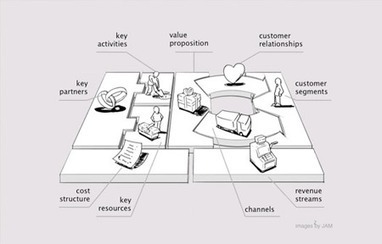 Your new post is loading...
 Your new post is loading...
STEVE BLANK: The barriers for starting a company have come down. Today, the total available markets for new applications are hundreds of millions if not billions of users, while new classes of investors are popping up all over.
Colleges will never tell you the real value of a business degree. Most companies nowadays rely on accomplishments and experience over good grades or a nice degree.
The pull-back in startup funding is real, but so are operational savings from cloud computing and recession-damped office rates.
BRAD FELD the co-founder of Feld Technologies, NetGenesis and Harmonix) reviews the traditional 1970s model business plan that he developed for those businesses and discovered that the business he eventually created had little to do with the plan. As a venture capital investor today, he does not read them and bases his investment decision on what the entrepreneur is able to show rather than tell. While the traditional business plan may have been the best approach at the time, it has become an historical artifact. Brad encourages today's entrepreneurs to use Steve Blank’s Lean LaunchPad approach to get out of the building and actually incorporate customer development early into the definition of their business. "As an entrepreneur, I encourage you to reject the notion of a classical business plan from the 1970s. You should still be thinking deeply about the business you are creating and communicate clearly what you are doing to investors. Just use contemporary approaches that are much more deeply incorporated into the actual creation of your product and business"
Michael Karnjanaprakorn, CEO/Co-founder of Skillshare, shares some research into how startups reach product-market fit. There are a lot of different methodologies in this area including those from Sean Ellis, Ash Maurya, Steve Blank, and Eric Ries. Michael links to great articles he found throughout his research and shares a simple methodology he been using at Skillshare to reach product-market fit.
The Value Proposition Designer (VP Designer) allows you to zoom into the details of your Value Proposition and the Customer Segments you target. You can use it as a poster (cf image below) to design better Value Propositions with sticky notes. However, to make sure your customers really want what you design, you’ll need to test all the assumptions you make with the VP Designer.
In honour of the innovative and technological theme of the TED conferences, we’re showcasing the most inspiring and useful TED and TEDx talks on entrepreneurship and tech. Do what makes you happy – Chip Conley Pitching to VCs – David S. Rose Life as a Bootstrapped Entrepreneur – Richard Branson Sweat the small stuff – Rory Sutherland Simon Sinek - How great leaders inspire action Trial, error and the God complex – Tim Harford Four principles for the open world – Don Tapscott How to get your ideas to spread – Seth Godin Why you have to fail to have a great career – Larry Smith Lies, damned lies and statistics – Sebastian Wernicke
The information provided in this infographic is timeless and transcends every medium by which your company represents itself. Be authentic, transparent, and above all, respectful of promises made and of the information users generously give. And last, trust is not built over night, rather it is “created through the repetition of positive interactions over time.”
Via Brian Yanish - MarketingHits.com, Gust MEES
What makes great ideas happen? Or not happen? We surveyed the creative community to track trends in productivity, priorities, and challenges. What are the core ingredients of great idea executions? How are our workspaces impacting our creative output? And why do we waste almost 40% of our productivity each day? To answer these questions and more, we polled the creative community, crunched the data, and transformed it into a beautiful, poster-size infographic - otherwise known as the 99%'s annual Idea Execution Audit.
A new study published online in Entrepreneurship Theory and Practice demonstrates the importance of presentation skills to the success of entrepreneurs seeking funding from potential investors. The study says common characteristics of a strong pitch included: Skilled storytelling: Tell a story about why your startup idea came about. What is that space in the market that is empty and how your idea can fill that space. For social and eco-entrepreneurs, usually this is the easy part as the foundation is already there, but weaving that information into a convincing narrative is crucial. Thorough command of the details: Develop a complete business plan and flesh out all the different aspects of your idea. If you are not in command of your idea how can anyone else be? Believability: The belief that entrepreneurs have in their own idea comes through in a pitch or presentation. Either you are sold or not and this can make or break your presentation. Do you believe your idea is the best thing since sliced bread? If yes, there are higher chances that your investors will think so too. Authenticity: There is no substitute for authenticity. Your passion to do something better shines through setting your idea apart from the other “also ran”. Strong preparedness: Entrepreneurs who have a great idea and can back it up with sheer preparedness obviously are picked. It helps to throw on a number of hats – finance, marketing, technology to show you have all the information to make your idea into a viable business.
Numerous technology businesses use some form of a “freemium model,” with most developing different strategies for generating revenue while managing the challenges and benefits that come with this approach.
Starting your own business has long been considered a risky proposition. But is it? This post explains that we should consider the following before dismissing that entrepreneurial drive so quickly. - Job Security Doesn’t Exist - You Don’t Have to Bet the Farm - Failing Isn’t that Bad - But You Don’t Want to Live with Regret
Learn the key tools and steps to build a successful startup (or at least reduce the risk of failure). An introduction to the basics of Steve Blank's famous Customer Development process, where entrepreneurs "get out of the building" to gather massive amounts of customer and marketplace feedback, and then use that feedback to continuously iterate and evolve their startup business models, improving the chances of success at every step. Steve Blank is a seasoned Silicon Valley entrepreneur and author of the book "The Startup Owner's Manual"
|
This is a well over due post and due to many reasons crowdfunding.info has become a bit of an archive for crowdfunding information. That is all about to change as crowdfunding.info is set to write informative posts on crowdfunding 101, new article features, research statistics on crowdfunding and a few little surprises along the way.
Crowdsourcing king Kickstarter.com might not be the best bet for aspiring entrepreneurs to raise funds. 1. Circleup.com - an online social marketplace that helps high growth small consumer and retail companies raise money directly from a community of accredited individual and institutional investors.
2. GoFundMe.com - Organizers are encouraged to treat supporters as a part of their story by posting Update messages and sending thank-you notes using the site’s
3. TechMoola.com - The TechMoola team reviews all questionnaires and if the project is accepted, the inventor provides campaign details including funding needs and deadlines.
4. RocketHub.com - Users post their project using various social media on the platform. They set their own funding goal and timeframe, and explain what they will give (goods or services) in exchange for funds.
5. RockThePost.com - The project creator produces a draft on Rockthepost.com complete with 3 components: a short video, a personal profile with images, and a reward list.
6. Fundable.com - is a platform for business-minded startups, founded by startup veterans. Companies exchange rewards and equity for funding to grow and launch their business.
7. Indiegogo.com - Each project creator sets up a page to address the “who, what, where, when and why.” Users are encouraged to add video, a personal storyline, plus perks for funders to make the campaign compelling.
From Steve Jobs to Charles Schwab these big names in business did things their way.
The Lean LaunchPad is a comprehensive, step-by-step guide created by Steve Blank and taught at Stanford, Berkeley, Columbia, Caltech and for the National Science Foundation. It is the foundation every entrepreneur should have to build a successful startup
Steve Blank has pioneered much of the theory around key areas that successful startups and businesses do right. If you aren't familiar with:
- Business models
- The business model canvas
- The customer development process
- The lean startup approach to development, and
- The link between customer segments and revenue streams
Recent Forbes articles have offered ample discussion of the traits of a successful early stage company, but today I’d like to take a closer look at the personality strengths of the actual entrepreneur. I’ve often wondered if some personality types are better suited than others. I would maintain a definite “yes.” The specific skills and personality strengths an entrepreneur brings to the table will have much to do with the venture's eventual success
Most current models of the entrepreneurial process propose a standard sequence of events, starting with opportunity recognition, resource acquisition, venture creation, and finally business expansion and growth.
For many entrepreneurs, the startup journey transforms them into more of a generalist than they likely were in a position at a larger company. This calls for specialized tools. The vocation-centric applications and programs no longer cut it. Productivity is essential when you have a lot on your plate. Time is money, so when an app is able to help you do more faster, it becomes worth paying for. Other apps will streamline communication or collaborative processes and reduce the friction of working in tandem with team members. Of course, no entrepreneur is all work, no play — taking a break will give your brain a rest, and it’s important to have options on hand that let you re-center your chi.
The value of the pros and cons listed differ significantly depending on the type of person looking to start a business. From what I have seen, pros outweigh the cons for the following startup profile: A person who has no experience in starting or managing a small business and who has invested their entire working life in corporations, they want to open a physical 'bricks & mortar' outlet, they have more assets than the capital required to commit to the franchise, they prefer to work in a team environment rather than do-their--own-thing, they have a profit-only mindset rather than an entrepreneurial one, they are entirely risk averse, they are comfortable in a managerial role (buying a job) with little interest in innovation or leadership and they see maintaining social status as important (identification with a known brand and avoiding the social stigma of failure). Franchising was at its height in the 1970s to early 2000s when starting a business predominantly meant opening a physical 'bricks & mortar' outlet. This business entry option required a significant investment risk that people understandibly wanted to mitigate via the low risk franchise model.
Today the business entry options are far more diverse with many built on the ultra low capital technologies of the internet that while not eliminating risk make any potential losses affordable.
So if you don't fit the previously described profile, then perhaps you are better with your own lean startup, gaining your startup expertise on-the-job by following the iterated customer development model promoted by Steve Blank. Here is his coursehttp://www.udacity.com/overview/...
Seasoned investors say that nine times out of 10, an entrepreneur is too busy focusing on the "idea" to think through the business model. It's astonishing how many entrepreneurs and even corporate executives focus on the great idea while looking past the fundamentals of how a business will make money and provide a return to capital providers
If you run a startup, you’re probably so busy trying to get funding and make your company profitable that you don’t have the time to find resources to help you along your way. Never fear! Here Susan Payton provides five great resources that can help you run your business more succesfully.
1. Incubators
2. Crowdfunding Sites
3. Free Business Advice
4. Analytics Tools
5. Social Media Tools
One of the toughest decisions for a startup is how to price their product or service. The alternatives range from giving it away for free (like Twitter), to pricing based on costs, to charging what the market will bear (premium pricing). The implications of the decision you make are huge, defining your brand image, your funding requirements, and your long-term business viability. The revenue model you select is basically the implementation of your business strategy, and the key to attaining your financial objectives. Obviously, it must be grounded by the characteristics of the market and customers you choose to serve, the pricing model of existing competitors, and a strategy you believe is consistent with your future products and direction. So what are some of the most common revenue models being used by startups today? Here is a summary, with some of the pros and cons or special considerations for each:
The top 20 articles that successful entrepreneurs have been reading over at YFS Magazine in 2011.
|

 Your new post is loading...
Your new post is loading...
 Your new post is loading...
Your new post is loading...







![Cheap Tech And Offices Mean Startups Need Less Funding [Infographic] | Starting your own business | Scoop.it](https://img.scoop.it/6Cd7mYoMJyx1rFGobew7FDl72eJkfbmt4t8yenImKBVvK0kTmF0xjctABnaLJIm9)



























Steve Blank give his insights into the ease of starting a business these days and how that is opening up opportunities for so many.